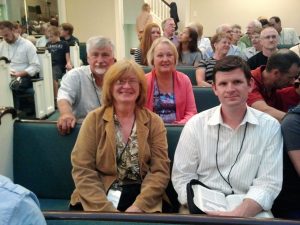Luke 22:14-23
When the hour came, he reclined at the table, and the apostles with him. Then he said to them, “I have fervently desired to eat this Passover with you before I suffer. For I tell you, I will not eat it again until it is fulfilled in the kingdom of God.” Then he took a cup, and after giving thanks, he said, “Take this and share it among yourselves. For I tell you, from now on I will not drink of the fruit of the vine until the kingdom of God comes” (9:14-18 CSB).
One day when I was a young teen, I bought a couple of “surfer shirts” for a dollar or two each. I think that they were the first clothes I had ever bought with my own money. I wore those shirts for years—through high school, college, and our first ten years or so of marriage. Finally, Sharon convinced me that it was time to get rid of those shirts. It was time for a change.
God is working out a long-term plan to display and to share his surpassing glory through the Lord Jesus Christ. Part of that plan involved his choice of a nation through which he would bring forth his Son, Jesus Christ. He made a covenant or solemn agreement of relationship with that nation, Israel. He administered that covenant through priests and sacrifices and the observance of laws and rituals. Everything in that covenant pointed to a better covenant in Christ that he would make with people chosen by grace from all nations.
In our text the Lord Jesus began to establish changes. These are changes from the law or old covenant made at Sinai to the new and better covenant in Jesus Christ. But like throwing away my surfer shirts, people have trouble accepting that God has made changes in Christ. Some people want to hang on to the laws and the rituals; others want to hang on to the old people with their separate physical, national existence; others want to stay with both. But Jesus says that a new day has come with a new covenant made by his blood. This new covenant brings with it a new people, a new spiritual nation in Christ Jesus and with better, eternal promises. Let’s think through these matters.
The time for the fulfillment of the law or old covenant had arrived. This meant the time for the fulfillment of its ceremonies, like the Passover (22:14-18).
The Passover was a time for family and neighbors to remember together God’s mighty act of redemption (Exodus 12:3-4; 24-27). Jesus acted as the head of the family to lead them in the remembrance. So in the previous section, he took charge in making sure everything was ready (Luke 22:7-13). His apostles were his family for that meal. Jesus eagerly desired to share this remembrance with them. He could recall what he did to bring Israel out of Egypt. So he leads the celebration of God’s faithfulness and power. He could use this celebration to continue to point them to his greater exodus (Luke 9:31). As everything for Israel pointed back to the exodus from Egypt, so everything for the new covenant assembly points back to the greater exodus of the cross and the resurrection.
The old Passover celebration had reached the end or goal of its purpose. Jesus was about to die as the ultimate and final Passover Lamb (1 Corinthians 5:7). Listen to and meditate on his words “before I suffer” (cf. Mark 8:31; 9:30-32; 10:31-34). His mind was fixed on what the Father had given him to carry out.
The next Passover that Jesus will partake of with his disciples is the one in the kingdom of God, which John later calls “the wedding supper of the Lamb” (Revelation 19:9). Now we must remember that “kingdom of God” equals “the reign of God”. The reign of God that Jesus is speaking of began with his appearance, was proclaimed in his teaching, was established by his death and resurrection, and will be fulfilled in the new heaven and the new earth. Here Jesus points to the fulfillment. But first he had to suffer and die as the Lamb of God to deliver his people from sin, guilt, and punishment. Then he could enter into glory (cf. 1 Peter 1:11).
Grace and peace,
David

 Luke 1:67-80
Luke 1:67-80
 Psalm 30:1-3
Psalm 30:1-3 Genesis 48:1-7
Genesis 48:1-7
 Leviticus 9
Leviticus 9